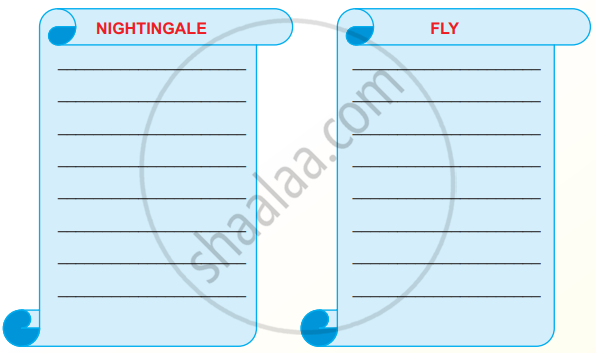Advertisements
Advertisements
प्रश्न
Now that you have read the poem, add more personality traits to the word-web of the frog and the nightingale as depicted in the poem. Then complete the given table. (Some of the words in the box below may help you. You may also use the words given in Q. 1.)
| Character | Extract | Personality traits |
| Nightingale | Sorry - was that you who spoke? | Polite, Timorous |
| Frog |
Yes,… you see, I'm the frog who owns this tree In this bog I've long been known For my splendid baritone. |
|
| Nightingale | Did you…did you like my song? | |
| Frog | Not too bad - but far too long The technique was fine, of course, But it lacked a certain force. | |
| Frog | Without proper training such as I And a few others can supply You'll remain a mere beginner, But with me you'll be a winner. | |
| Nightingale | But I can't sing in this weather | |
| Nightingale | …This is a fairy tale - And you're Mozart in disguise Come to earth before my eyes. | |
| Frog | Come, my dear - we'll sing together. | |
| Frog | We must aim for better billing You still owe me sixty shillings. |
|
| Frog | Brainless bird - you're on the stage Use your wits and follow fashion. Puff your lungs out with your passion. | |
| Frog | …I tried to teach her, But she was a stupid creature. |
| Dismissive Nervous Timid Presumptuous Superior Fawning Shy Polite Meek Possessive Dominating Mercenery |
उत्तर
| Frog | Dominating, Possessive |
| Nightingale | Meek, Naive |
| Frog | Presumptuous, Conniving |
| Frog | Superior, Sly, Arrogant |
| Nightingale | Timid, Nervous |
| Nightingale | Fawning, Polite, Servile |
| Frog | Crafty, Patronizing |
| Frog | Mercenary, Manipulative |
| Frog | Insensitive, Commanding |
APPEARS IN
संबंधित प्रश्न
Have you come across people who are not what they seem to be - like someone who is extremely friendly and helpful yet you are not very comfortable with him / her as you feel it is a put-on? Have a class discussion about such people and why you feel as you do.
Divide yourselves into groups of four or five and brainstorm on any one of the given situations in order to create an imaginary dialogue or a comic strip. Keep in mind the characters and situations while doing so. Representatives from each group could then present the dialogues / read them to the class.
| Situations a. The efforts made by the other creatures of the bog to still the frog's determination 'to display his heart's elation'. b. The first time the Nightingale sings. c. The nightingale is awestruck when the frog introduces himself. d. The practice session when it is raining. e. The nightingale is reprimanded by the frog when the box office crashes. |
On the basis of your understanding of the poem, complete the sentences given below by choosing the appropriate option.
- The frog's aim was to
Read the stanza given below and complete the sentence by choosing the appropriate option.
- The audience was tired of her song because
Answer the following question briefly.
Why is the frog's joy both sweet and bitter?
Answer the following question briefly.
Why was the frog angry?
The Frog and the Nightingale is a spoof on the present society. Study the Mind Map given below. Divide yourselves into groups, select a box and discuss the statement given. Then present your views to the class.

Topics for CLASS DISCUSSION
a. How a person tries to put down another when that person is succeeding in his or her life.
b. Our self-image is often based on what others make us believe we are. A poor selfimage can do irreparable damage to us. Do you agree with this statement?
Elaborate with suitable reasons and examples.
Write an obituary for the nightingale. You may begin like this: May the kind soul……… (or you may make use of your own beginning)
Listen to your teacher recite the poem The Spider and the Fly by Mary Howitt and compare the Fly to Vikram Seth's Nightingale.

Even though both, the frog from Vikram Seth’s poem, The Frog and the Nightingale and Abel's children from the play, The Dear Departed, display greed, there are differences. Elaborate, in about 150 words, how the greed of the frog and that of Abel's children differ in motivation, actions, relationship, and consequences.
